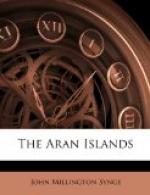The men wear three colours: the natural wool, indigo, and a grey flannel that is woven of alternate threads of indigo and the natural wool. In Aranmor many of the younger men have adopted the usual fisherman’s jersey, but I have only seen one on this island.
As flannel is cheap—the women spin the yarn from the wool of their own sheep, and it is then woven by a weaver in Kilronan for fourpence a yard—the men seem to wear an indefinite number of waistcoats and woollen drawers one over the other. They are usually surprised at the lightness of my own dress, and one old man I spoke to for a minute on the pier, when I came ashore, asked me if I was not cold with ‘my little clothes.’
As I sat in the kitchen to dry the spray from my coat, several men who had seen me walking up came in to me to talk to me, usually murmuring on the threshold, ‘The blessing of God on this place,’ or some similar words.
The courtesy of the old woman of the house is singularly attractive, and though I could not understand much of what she said—she has no English—I could see with how much grace she motioned each visitor to a chair, or stool, according to his age, and said a few words to him till he drifted into our English conversation.
For the moment my own arrival is the chief subject of interest, and the men who come in are eager to talk to me.
Some of them express themselves more correctly than the ordinary peasant, others use the Gaelic idioms continually and substitute ‘he’ or ‘she’ for ‘it,’ as the neuter pronoun is not found in modern Irish.
A few of the men have a curiously full vocabulary, others know only the commonest words in English, and are driven to ingenious devices to express their meaning. Of all the subjects we can talk of war seems their favourite, and the conflict between America and Spain is causing a great deal of excitement. Nearly all the families have relations who have had to cross the Atlantic, and all eat of the flour and bacon that is brought from the United States, so they have a vague fear that ‘if anything happened to America,’ their own island would cease to be habitable.
Foreign languages are another favourite topic, and as these men are bilingual they have a fair notion of what it means to speak and think in many different idioms. Most of the strangers they see on the islands are philological students, and the people have been led to conclude that linguistic studies, particularly Gaelic studies, are the chief occupation of the outside world.
‘I have seen Frenchmen, and Danes, and Germans,’ said one man, ’and there does be a power a Irish books along with them, and they reading them better than ourselves. Believe me there are few rich men now in the world who are not studying the Gaelic.’
They sometimes ask me the French for simple phrases, and when they have listened to the intonation for a moment, most of them are able to reproduce it with admirable precision.




